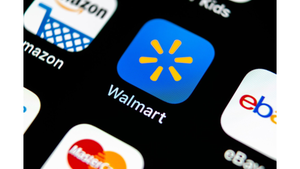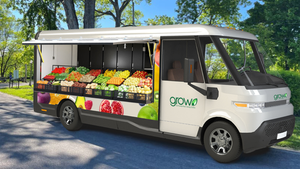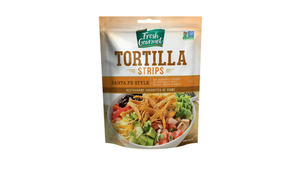FILLING STATIONS
The popularity of water dispensing machines at supermarkets is on the rise, with no crest in sight.Major chains and smaller operators alike are installing more systems to dispense filtered water, according to retailers, grocery wholesalers and system suppliers interviewed by SN.They said water dispensers to some extent are riding the same consumer trend wave as the other bottled waters that are moving
July 25, 1994
RICHARD TURCSIK
The popularity of water dispensing machines at supermarkets is on the rise, with no crest in sight.
Major chains and smaller operators alike are installing more systems to dispense filtered water, according to retailers, grocery wholesalers and system suppliers interviewed by SN.
They said water dispensers to some extent are riding the same consumer trend wave as the other bottled waters that are moving off retailers' shelves: a desire for healthier beverages.
Water vending machines have been a supermarket staple for years in scores of rural communities where "don't drink the water" was an unwritten rule. But today, units increasingly are being found at supermarkets in major metropolitan areas throughout the country.
Industry sources said water vending machines are popping up at more supermarkets because of:
Public concerns over germ infestation and frequent breakdowns of aging municipal water systems.
The increased use of water overall as a healthy alternative to other drinks.
Pricing that usually falls substantially below that of bottled spring water.
It is difficult to gauge just how many dispensers currently are
operating inside or outside supermarkets. The dispenser machine industry's growth is not being tracked by any organization, and national figures could not be obtained on the number of units on site or gallons sold through them.
However, several of the biggest retailers have installed units recently or expanded their programs, including Kroger Co., Winn-Dixie Stores, Super Kmart Centers, Piggly Wiggly and some Shop 'N Bag locations. The trend is buoying a flotilla of local and regional system suppliers who keep adding retail accounts.
Interestingly, most retailers contacted said they don't see vending machines impeding the flow of their other bottled water sales off the shelf. Opinions varied over whether the systems are adding customers, however.
"We find the dispensers are growing the water category," said Harland Polk, senior vice president at Hughes Family Markets, Irwindale, Calif.
"The machines add to the total bottled water business. At the present time, bottled water sales inside the store continue to show increased sales," said Michael Hatch, vice president of retail operations at Smitty's Super Valu, Phoenix.
"Sales are up for us inside the stores. There is a cross-over. People will buy a gallon inside, keep the jug and then reuse it. I don't know that it attracts new consumers, but the consumers see it as a means of convenience," he said.
Retailers told SN the machines do not appear to be cannibalizing traditional bottled water sales.
"In the 10 stores where we have the machines, we haven't seen any great effect on cannibalizing sales of bottled water. Water is still a good category," said Joanne Gage, vice president of consumer services at Price Chopper Supermarkets, Schenectady, N.Y. "It is nice to give people the choice and we will continue to do that. There certainly seem to be preferences."
"The water dispensing machines attract a different customer than in-store bottled water does. As a result the machines are helping to build total water sales," said Jerry Bonicelli, general manager at Mega Markets Super One Foods, Memphis, Tenn.
"The service and operation of the machines has been excellent," he added.
The typical water dispensing machine filters regular tap water, removing solids, minerals and impurities. According to the Food and Drug Administration, a product can be considered purified water if it has less than 10 parts per million of dissolved solids.
"Water vending is highly regulated by the states and it continues to become more regulated," noted Larry Eils, director of health, safety and technical standards at the National Automatic Merchandising Association, Chicago.
Most machines use distillation, deionization, reverse osmosis or some combination of the three to purify the water. Several of the newer units use an ultraviolet light to kill bacteria. Some companies use these machines and sell the purified water to stores to use in their produce misting systems, reducing the incidence of bacteria formation and calcium buildup on mirrors.
Consumers generally use their own jugs or purchase jugs from the store to fill with water, said retailers. The outdoor and vestibule machines are typically coin-operated, while water dispensed from in-aisle machines usually is scanned at the checkout lane.
Retailers said much of the interest in water vending machines springs from worries about the safety of the drinking water in their local operating areas.
"The growth of vending machine water in our market is being fueled by the ongoing concern over the local tap water as well as environmental benefits and the overall quality of water," said Hatch of Smitty's Super Valu.
"Every time we have a scare, like the cryptosporidium in Milwaukee, we can see our water volume go up," said Darrell Doll, director of retail operations at Fleming Cos.' Milwaukee division, Waukesha, Wis.
"We get an awful lot of water out of the warehouse in gallon jugs, but stores do [order incorrectly] and miss out. You've got to have the water machine so you can always take care of that customer, because when there is a scare, the sales go nuts."
Doll's responsibilities include the supervision of the water dispensing machines that are in 21 of the division's 36 corporate-owned Sentry Stores and Supersavers. The machines are located inside the store as close to the water section as possible.
Doll added that he expects water machines to be installed in the remaining corporate stores in the near future in response to continued consumer demands for pure water.
"I initially put the systems in where the water quality was the worst, in [outlying] areas where we sell a lot of salts and water softeners. Now it is getting bad in Metro Milwaukee, so we're starting to put them in Milwaukee, and I bet that within a year we'll have them in all of our stores," he said.
"I think environmental concerns have a lot to do with it. I have also noticed changes in drinking habits. People are going more toward a water instead of soda or tea or carbonated beverages," said Bonicelli of Mega Markets.
Mega Markets has a machine in each of its 44 stores in California, Missouri, Oklahoma, Tennessee, Arkansas and Kentucky. The coin-operated machines are operated by different suppliers, depending upon the state.
Distrust of tap water is not the only incentive, however. Retailers said the water dispensers are used for filling jugs because they offer customers a lower-cost alternative to traditional bottled water.
"For the machine water we charge 35 cents a gallon, while our private-label bottled water is about two for $1," said Terry Stapleton, Sack 'n Save division director at Minyard Food Stores, Coppell, Texas. Minyard has machines in three of its 19 Sack 'n Save warehouse stores and about six of its conventional Minyard units.
The indoor machines offer more leeway in pricing, one vendor told SN. "The outside [machines] are coin-operated and the inside ones are not, because people pay at the checkstand. We can do things inside that we can't do outside. For example, we play around with nines instead of fives. If the machine outside is 25 cents a gallon, inside we may be 29 cents or 19 cents a gallon," he said.
Hatch of Smitty's Super Valu said the machines are "very profitable." Water retails at 25 cents a gallon, while Smitty's prebottled water is sold inside the store at two for $1, and is often on sale at three or four for $1.
He said Smitty's switched to a "more up-to-date" reverse osmosis system in May. The chain has 56 outdoor machines -- two for each of its 28 stores. "It is a better-quality water, in my opinion, and it pumps more gallons than the old system," he said.
The machines can be found both inside and outside stores, apparently based on the local climates. In warmer areas of the the West and South they are typically outside the store, while they show up in the store vestibule or in an aisle in Northern locations.
Price Chopper in upstate New York installs them indoors, said Gage, near the entrance or exit, because they would freeze during the area's brutal winters if they were outside.
In warmer climates the outdoor machines do better, said retailers, although some were concerned that cross-merchandising opportunities were limited by placing them outside.
"We have over 100 water dispenser machines located outside our stores. They bring additional sales with a favorable consumer value to shelf bottled water," said Polk of Hughes Family Markets.
On a positive side, having the machines outside helps to relieve some of the pressure on undersized water sections," Polk said. However, with the water dispensers located outside the store, we find that the customer does not always enter the store."
Vendors told SN that even if a machine is located outside the store, it can be a profit center because a store can rent otherwise dead space to the operator instead of giving up merchandising space in the store.
"There are certain disadvantages to being on the inside," said an official with a leading California-based vendor. "When it is in-store, there can be confusion on what to ring when people bring their own container."
About the Author
You May Also Like




